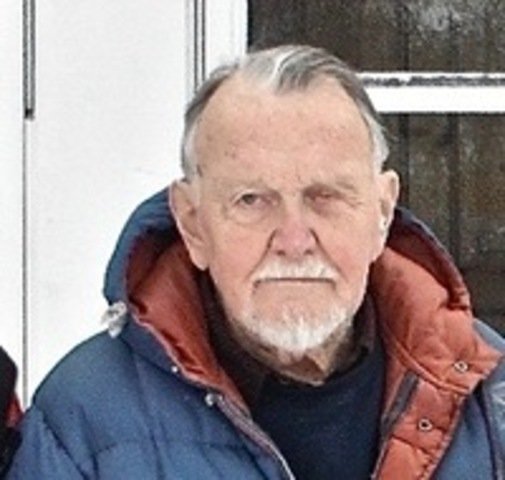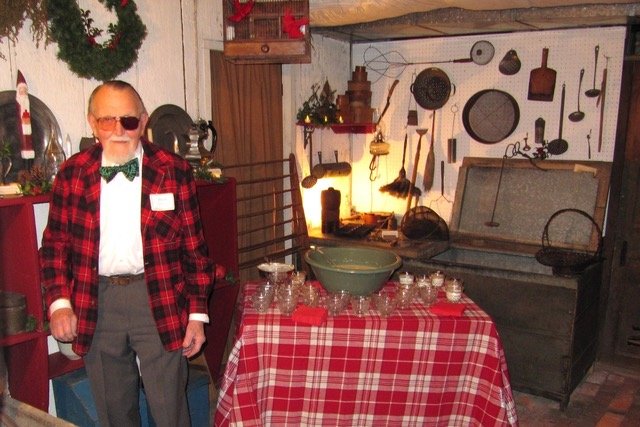A Legacy of Kindness: Dick Johnson (1926-2022)
...a blog by Bethany Groff Dorau
Two weeks ago, I took a picture of myself holding a letter “D.” It was a group effort, spelling out “Happy New Year, Dick,” a token of our affection for Byfield’s Dick Johnson, who died on January 14. Many, many of you will grieve his loss. Today, I am crushed by the weight of it, even though I am a bit player in his extraordinary life. I have never met anyone who knew Dick who did not immediately tell me a story about him, even if it was just a story he had told them about someone else. Everything he said was memorable.

And so, I beg leave to tell you my Dick Johnson story.
It was 2000. I was twenty-five with a new husband and an even newer baby. I had my first out-of-grad-school job as lead guide at the Spencer-Peirce-Little Farm. Maggie, the site manager at the time, was already planning her escape, and so when I offered to take on additional tasks, like attending community meetings in the evenings, she readily agreed.
My first assignment was to represent the farm in CALM, the Cultural Alliance of the Lower Merrimack, long since disbanded. I was a bit of an outlier in that group - the youngest by decades and the only person who did not know everyone else in the room.
In 2000, the primary, decidedly not “calm” topic of discussion was who was going to get us a float in the Yankee Homecoming parade. Because it was ABOUT TIME we had a FLOAT in the PARADE.
This was the single greatest wish of Al Moskowitz, representing the Newburyport Art Association, who sat on one side of me at a large round table, while his beatific bride, Rhina Espaillat, representing the Powwow River Poets, beamed at us from the other side.

A long-time friend of the Museum of Old Newbury, Dick Johnson was well-known for his potent eggnog, here served at the 2010 Holiday Party. Photo courtesy of Sally Chandler.
Dick Johnson, representing the Historical Society of Old Newbury, occupied the chair next to me, one eye covered with a padded cotton patch. As Al held forth at considerable volume from my left side, Dick decided to interrogate me from the right. It went something like this.
Dick (shout-whispering): So, where are you from?
Me (quiet whispering): I just finished grad school in Amherst.
Dick: What? I mean where are your PEOPLE from?
Me: Um, West Newbury and, um, Byfield. My dad’s from Waltha…
Dick (actually shouting): WHERE IN BYFIELD?
I admitted with some shame that my most recent Byfield relative was my great-grandmother, Mary Dyer Noyes, who married Philip Poore in 1905 and moved to West Newbury. “Oh, I know Mary,” he said. “Can’t be the same Mary,” I said. “She died in 1934.” “I’m older than I look,” said Dick. Then, shouting again, “WHO ELSE DO YOU KNOW FROM BYFIELD?”
It may seem ridiculous to think that one can drop the name of a person one has never met, who died decades before one was born, and claim that you “know” them, but such is life in an old New England town.
“Well,” I said, “there’s my great-great grandfather, Joshua Dummer Noyes.” Dick nodded. “Everyone called him Dumma,” he said. “And there’s his brother, George Washington Noyes…” Dick pushed back his chair and swiveled around to face me, his one eye filling with tears. “You’re George Noyes’ granddaughter?”
“Well,” I said, my newly minted historian’s desire for accuracy trumping the need to stop talking at full volume while Al Moskowitz was explaining his plans to turn an old landscaping trailer into his dream float. “He’s my great-great-great…” Dick waved his hand at me. “He was a lovely man,” he said, a tear falling into his white beard. “He saved my life.”
And then Dick Johnson told me the story of how he lost his eye.
He was plowing (or mowing) behind a team with his brother. He was five, maybe six years old. A rock was kicked up by the plow and flew up into his eye. His brother, terrified that he was dying, sat him down alongside a nearby road and told him to wait while he got help.

George Washington Noyes (1874-1956).
Dick was bleeding profusely, holding a rag up to his eye, all alone and in shock, when George Washington Noyes, who would have been in his 70’s and had known Dick his whole life, happened to come by. He was not a doctor. As far as I can tell, he didn’t even have a clean rag to offer the child, but he picked him up and held him on his lap and told him that he was going to be alright, that help was on its way, that he was a child of God.
And help did come, and Dick did not die, though of course he lost the eye. When I met him, he was already as old as George Washington Noyes had been when he held him in that field, and Dick still believed that he had saved his life. “I’m glad to meet you,” he said, wiping under the rim of his glasses. I know he meant that he was glad to have thought about George after all these years.
Al was still holding forth about the float. Someone on the other side of Dick suggested that perhaps he should pipe down. He winked at me. “I always sit on his deaf side,” he said. “Which, fortunately, is also my blind side.”
I would love to hear other recollections of the story of how Dick Johnson lost his eye. I am sure that he has told it to many other people. I tried hunting for details in the Newburyport paper, which ran a lengthy column of accidents and injuries in the 1930s. It is rather stunning how many eyes were grievously injured in Byfield, but I have yet to find a record of Dick Johnson’s accident.
Just as COVID was closing in, I received an envelope in the mail from Dick. After CALM disbanded, we had continued to greet each other joyously at social and community events, but I had not seen him in years. I thought about him often, though, and talked about him a good bit too. It continues to tickle me that I was given so much credit for a kindness done by my great-great-great uncle all those years ago.

Front row: David, Bud, and Dick Johnson. George Washington Noyes in the rear. Circa 1930.
In the envelope was a note and a picture of Dick Johnson, age four, an impish smile on his sweet face, along with his brothers David and Bud. And behind them in overalls, is George Washington Noyes, his hands resting on Dick’s shoulders. Dick wrote on the bottom of the enclosed note, “86 years ago,” and his name and address in case I had forgotten him. As if anyone could forget him.
The kindness that, by all accounts, was second nature to George Washington Noyes, survived him in stories like these. The wit, generosity of spirit, and stubborn Yankee charm of Dick Johnson will survive him too, while we who knew him keep telling each other these stories.
In a final act of kindness, Dick Johnson’s family has invited his friends to contribute in his name to two organizations dear to his heart; our own Museum of Old Newbury (donate here), and the Essex County Greenbelt Association.
